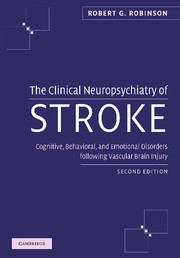 The Clinical Neuropsychiatry of Stroke
The Clinical Neuropsychiatry of Stroke Book contents
- Frontmatter
- Contents
- Preface
- Part I Introduction
- 1 Recent trends in the epidemiology of stroke
- 2 Historical perspective
- 3 Brain organization and cerebral basis of emotion
- 4 Vascular anatomy and classification of stroke
- Part II Poststroke depression
- Part III Poststroke mania
- Part IV Poststroke anxiety disorders
- Part V Other poststroke disorders
- Index
2 - Historical perspective
from Part I - Introduction
Published online by Cambridge University Press: 01 October 2009
- Frontmatter
- Contents
- Preface
- Part I Introduction
- 1 Recent trends in the epidemiology of stroke
- 2 Historical perspective
- 3 Brain organization and cerebral basis of emotion
- 4 Vascular anatomy and classification of stroke
- Part II Poststroke depression
- Part III Poststroke mania
- Part IV Poststroke anxiety disorders
- Part V Other poststroke disorders
- Index
Summary
A historical perspective of the neuropsychiatric disorders associated with stroke must logically begin with a discussion of the word “stroke.” Although many clinicians do not like the term “stroke,” it has become so ingrained in both the public and professional literature that it will likely remain the primary word used to describe this cerebrovascular disorder.
One of the problems with the word “stroke” is that it has multiple meanings. A stroke of luck or a tennis stroke have very different meanings from the catastrophic medical disorder. Originally the term was used in medicine to describe being struck down by an illness, especially one which rendered the victim unconscious or paralytic (Millikan et al. 1987). The use of the word stroke to indicate apoplexy (plexus meaning stroke and apo meaning from) began in the 17th century. The recognition, however, of apoplexy as an important medical condition is evident from the writings of Hippocrates (460–370 BC). He noted that unaccustomed attacks of numbness and anesthesia were a sign of impending apoplexy and that when patients, who were not febrile, complained of headache, noises in the head, vertigo, slowness of speech, or numbness of the hands, there was a high likelihood that they would become epileptic or suffer from apoplexy (Millikan et al. 1987).
- Type
- Chapter
- Information
- The Clinical Neuropsychiatry of StrokeCognitive, Behavioral and Emotional Disorders following Vascular Brain Injury, pp. 9 - 16Publisher: Cambridge University PressPrint publication year: 2006


